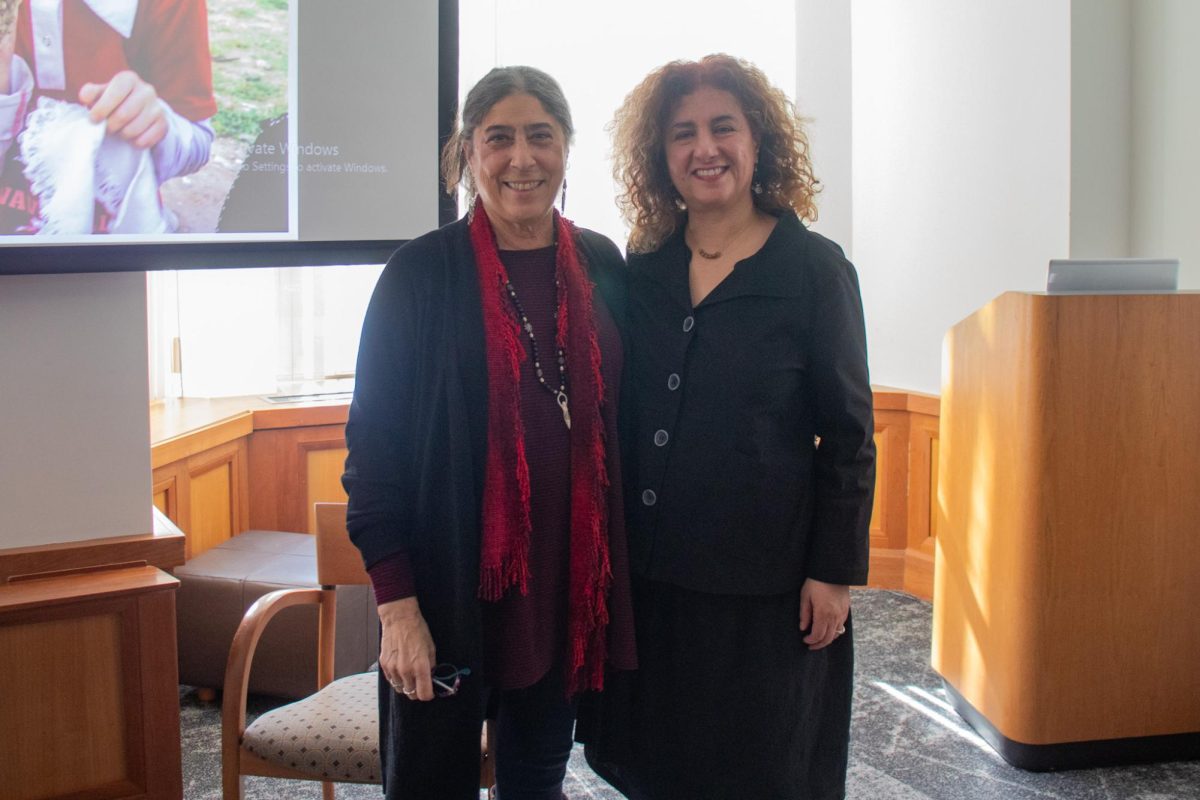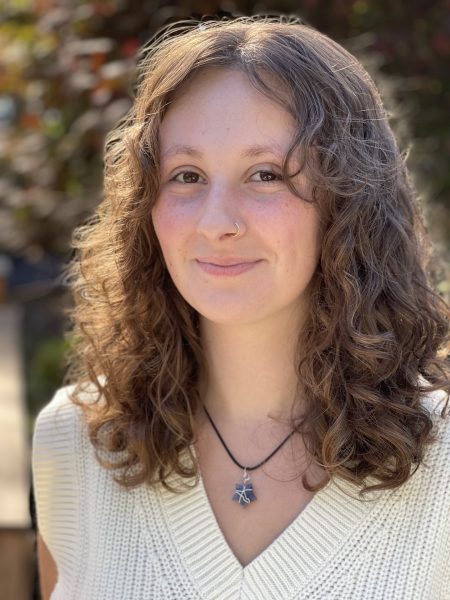Suffolk University hosted an informational conversation with Alice Rothchild Feb. 18 about “The Health and Human Rights Crisis in Gaza.” Rothchild is a physician, author and activist who has worked with people in Gaza for years to share their stories and bring light to the history of Palestine.
The 15-month war and genocide in Gaza has led to over 61,000 deaths and over 111,000 injuries as of Feb. 5, according to Al Jezeera. With a ceasefire deal in motion, the first phase is set to release 33 Israeli hostages being held in Gaza and nearly 2,000 Palestinian prisoners being held in Israel.
The event started with a lecture discussing the recent history between Israel and Palestine and the ongoing attacks and ethnic cleansing within the Middle East. The lecture then opened to a Q&A session where Rothchild shared her experiences and perspective on the pressing social justice issues plaguing communities both in the Middle East and in the broader societies in Western culture.
“The crux of the problem is that the status quo can only continue if we as human beings see Jews as more human, more deserving, more innocent and honorable than Palestinian Arabs and if we as a community are blind to Arab suffering and the history of settler colonialism. So I think the fundamental issue comes down to racism, which potentially leads to ethnic cleansing and genocide,” said Rothchild.
Junior international relations major Jacob Rodriguez attended the event and said that he appreciated the use of data in the lecture to bring perspective on the severity of the conflict’s impact.
“People say that, ‘oh, it’s a complicated conflict.’ And, like, it’s not really, actually one group has the majority of the power and resources, and the other doesn’t,” said Rodriguez. “How that gets resolved, that kind of stuff that might be more complicated, but when you present it like that, it is a very clear situation of haves and have-nots in terms of power.”
With a background in healthcare inequality, Rothchild spoke about what access to healthcare looks like in Gaza.
“There is a form of legalized institutional racism. So the question we have to ask is, are Jewish Israeli clinicians able to see Palestinian citizens of Israel or Palestinians in the territories as fellow equal human beings? I will point out that in November 2023, 100 physicians signed a letter approving the bombing of Gaza hospitals,” said Rothchild.
Breaking down healthcare access in Gaza right now led Rothchild to the idea of medical apartheid, which she described as “two separate systems, two separate realities.” This leads to inequities in access to healthcare for Palestinians.
“For me, health includes freedom of movement, access to health services and then all the kinds of things that make up as possibilities living in a healthy society – like clean water, sanitation, nutrition, housing, the ability to get educated, the ability to be employed and also living in a nonviolent situation,” said Rothchild.
But this, Rothchild explains, is not what healthcare looks like for those living in Gaza. An example she used was pamphlets given to pregnant women. Typically, these pamphlets would give an overview of what you need to do to keep yourself and the baby healthy. The pamphlets handed to pregnant people in Gaza give an overview of what to do if you’re caught in labor at a border checkpoint.
The intersectionality between healthcare and politics was significant in Rothchild’s work as a physician even before starting her work in Palestine. Rothchild said when she was entering the medical field, she was paving her own way, not seeing many other female medical students.
Rothchild’s advocacy and work is rooted in presenting the truth and letting Palestinians speak for their own history. Coming from a Jewish background, she did not learn the whole story of conflict and oppression that existed between Israel and Palestine because of religious bias and in her career, Rothchild continues to learn and let people’s own voices tell their story.
Professor Shoshana Madmoni-Gerber, the moderator for the event, spoke about complexities within Jewish culture in idealizing Israel and the harm this can cause to other groups of people who are oppressed.
“I feel that on some fundamental level, we have such a disconnect in our ability to have an honest conversation while leaving room for Jewish victimhood. It doesn’t have to be a competition. These people suffer, then these people suffer, and it doesn’t mean that suffering is giving you a license to cause more suffering,” said Madmoni-Gerber.
Rothchild credited much of her political interest to being a college student during the Vietnam War. She talked about the visuals of her fellow students protesting and seeing change come from that was her first step into the realm of political activism.
“I developed the idea that we had a responsibility as US citizens, to protest government policies that were unacceptable and that even if the war was very far away, it was affecting us, and it was affecting the communities and commodities. And it was our responsibility to do something about it,” said Rothchild.
In recent comments, President Donald Trump outlined his plan to “clean out” Gaza and have the U.S. assume control over the territory while over two million Palestinians would be forcibly relocated.
Rothchild said that his plan was “completely stupid” and that the message from almost all Palestinians is that they will not leave. The population of the Gaza Strip is overwhelmingly refugees, Rothchild said, and many are there because they were forcibly removed from their homes.
“The big question is, who will feed, shelter, educate and give medical care for over a million Gazans who are in total desperation? And this is happening at a time when our president is banning U.S. foreign aid,” said Rothchild.
In 2023, the United Nations recognized 75 years since the mass displacement of 700,000 Palestinians due to the 1948 Palestine War. This displacement has remained significant to many.
“They literally left food on the table, the piano music on the piano, yeah, just they had no idea that they would never, ever come back. So if you listen to Palestinians talk, they always say the lesson from ’48 is you do not leave, so that is part of the cultural heritage of the folks in Gaza,” said Rothchild.
Neka Vladinyoe, a history and global and cultural communications double major at Suffolk, attended the event because of their dedication to Palestinian liberation.
“I strongly believe we need to uplift the Palestinian perspective. We have been hearing too much propagandized Israeli perspective, so we really need to hear more of this side,” said Vladinyoe.
Media representation has been essential to the ongoing conflicts because, in Western culture, it is often difficult to find unbiased information. However, Rothchild said that this does not exist.
“Nothing is unbiased,” said Rothchild. “Our job is to figure out what our biases are and say upfront, these are my biases, now let’s talk. I think that’s a critical thing to be very self-conscious about because there is no such thing as unbiased.”
Many of the biases in mainstream media, Rothchild highlighted, favor Israel and sympathize with Israeli suffrage more than with Palestinian suffrage. Oftentimes, when there is a tragedy in Israel, involving Israeli people, you learn the story of who is affected – their name, their story – but when it happens to a Palestinian, they are a number – one of many.
“The amount of humanity that was invested in reporting on what was going on with people who were Palestinians was totally different than what was going on in Israel,” said Rothchild.
When taking a step back to before the current war, Rothchild had gone to Gaza multiple times to work with the organizations, Jewish Voice for Peace and We Are Not Numbers. On one of her trips with We Are Not Numbers, Rothchild went to meet with a group of young Gazans and have a workshop about healthcare. Instead, the group took her to see the beauty of Gaza.
“They wanted me to know that they weren’t just suffering victims, that they had agency, they had dreams and that they saw the place that they lived as very beautiful, which it was,” said Rothchild.
On Jan. 27, hundreds of thousands of Palestinians walked through Gaza to return to what was left of their homes in Northern Gaza. After leaving 15 months earlier, many celebrated their long-awaited return.
Rothchild said that 250 people were hospitalized from exhaustion and one person died during the walk.
“They would rather be living in a tent at the site of their homes than to remain refugees again,” said Rothchild.
This marks the beginning of what could be the rebuilding of Gaza, however, there is still so much that can change and things are not over for people in the Middle East.
“We can’t forget about people in Gaza, we can’t forget about people in the West Bank, we can’t forget about the issue of Palestine and Palestinians in general, because, frankly, they have no advocates other than people who choose to advocate for them,” said Rodriguez.
Towards the end of the event, a student read part of a poem that was published by We Are Not Numbers.
“So if we die, erase us from your memory. Forget us. Turn the pages on Palestine and turn and tear us out of your history books. Tell your friends there was once hope here, but it has faded into oblivion. Live your lives as if we never existed, play, drink, eat, walk, celebrate, decorate, sing and dance, but whatever you do, don’t look in the mirror. If you dare to look, you’ll see our blood on your faces. You’ll see our severed limbs in your hands, you’ll hear our screams echoing in your expressions, and the smoke of our voices will etch Palestine onto your chest,” the excerpt read.
Despite the new stages of the ceasefire and the glimmer of hope, many remain without hope, including Rothchild.
“I don’t know if I have hope, but I feel like you have to behave as if there’s a future,” said Rothchild. “So I think you can’t stop protesting, dissenting and pressuring because then you just give it up and you just write people off that should not be written and we are lesser people if we do that, and they are gone.”





















